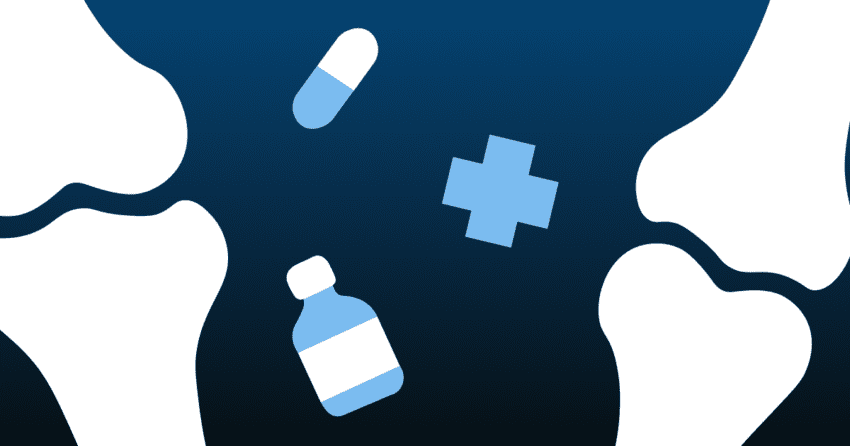Nutrition plays a crucial role in supporting the wellness of your bones including your vertebrae, but is often an overlooked component of spinal heath. By maintaining a healthy lifestyle and diet, the risk of debilitating issues from spinal degeneration and osteoporosis are reduced.
The bones of the body are dynamic, living tissues. Throughout life, the bones of the spine (vertebrae), are in a constant state of building and repair. This ongoing process is supported by dietary intake of specific nutrients. Relationships between back pain and certain diets have been found, as demonstrated by a diet high in sugar and salt being strongly associated with back pain, whereas a high protein diet had the opposite effect. Similarly, the functioning of the central nervous system has been linked to dietary factors.
Starting good nutritional habits early in life is important for building a strong foundation to support the body throughout life. But any age is a good age to start practicing better dietary habits; even if you already have a spinal condition. Bone strengthening occurs at a faster rate when we are young, and proper nutrition supports this process.
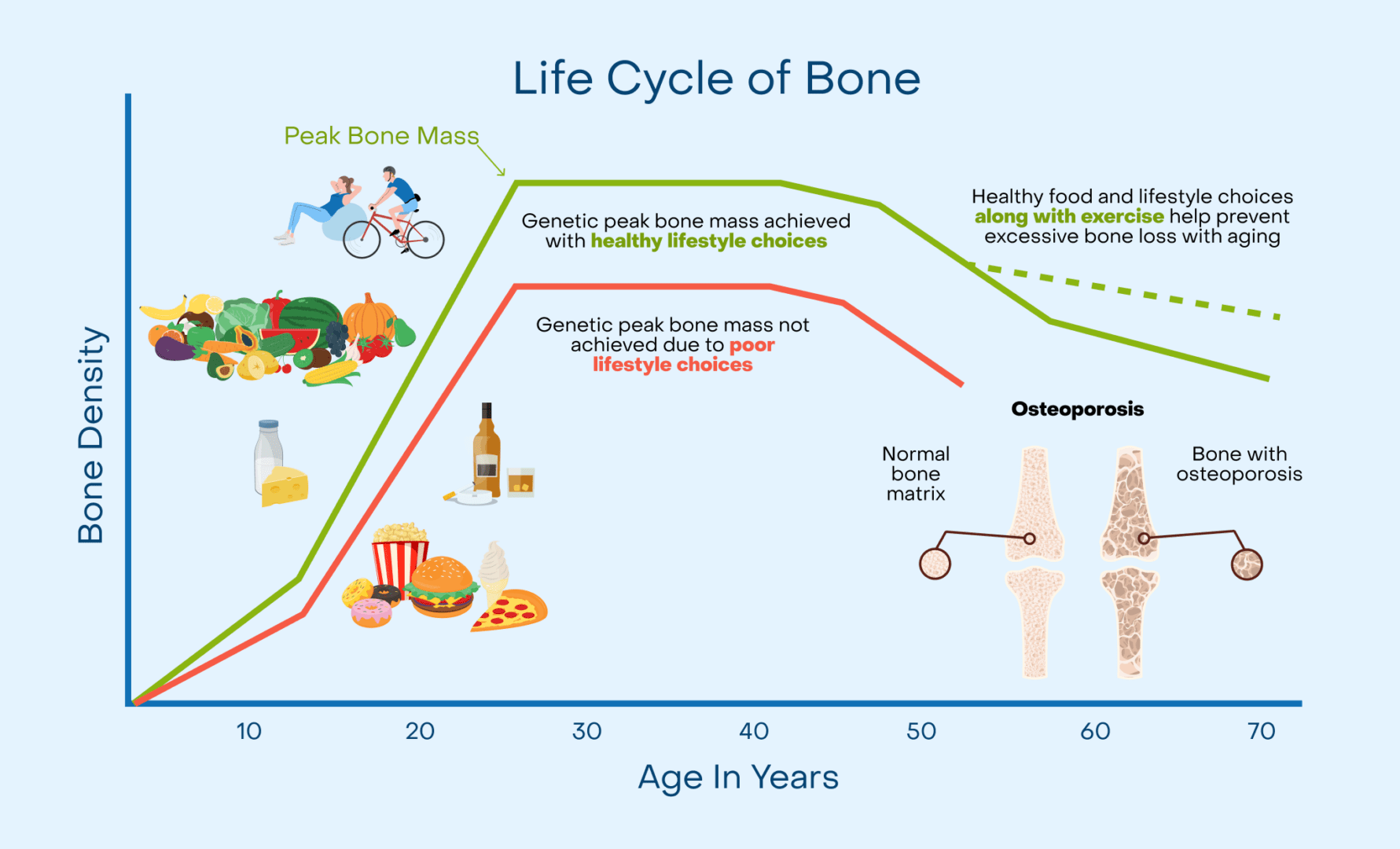
By age 18, 90% of peak bone mass has been achieved, and most young women and men reach their maximum bone density by their late 20s. Although genetics determine 60% – 80% of peak bone mass, lifestyle choices, including diet and physical activity, account for the rest. Any condition that interferes with achieving optimal peak bone mass can, therefore, increase your risk of fracture later in life.
What vitamins and minerals are important for bone health?
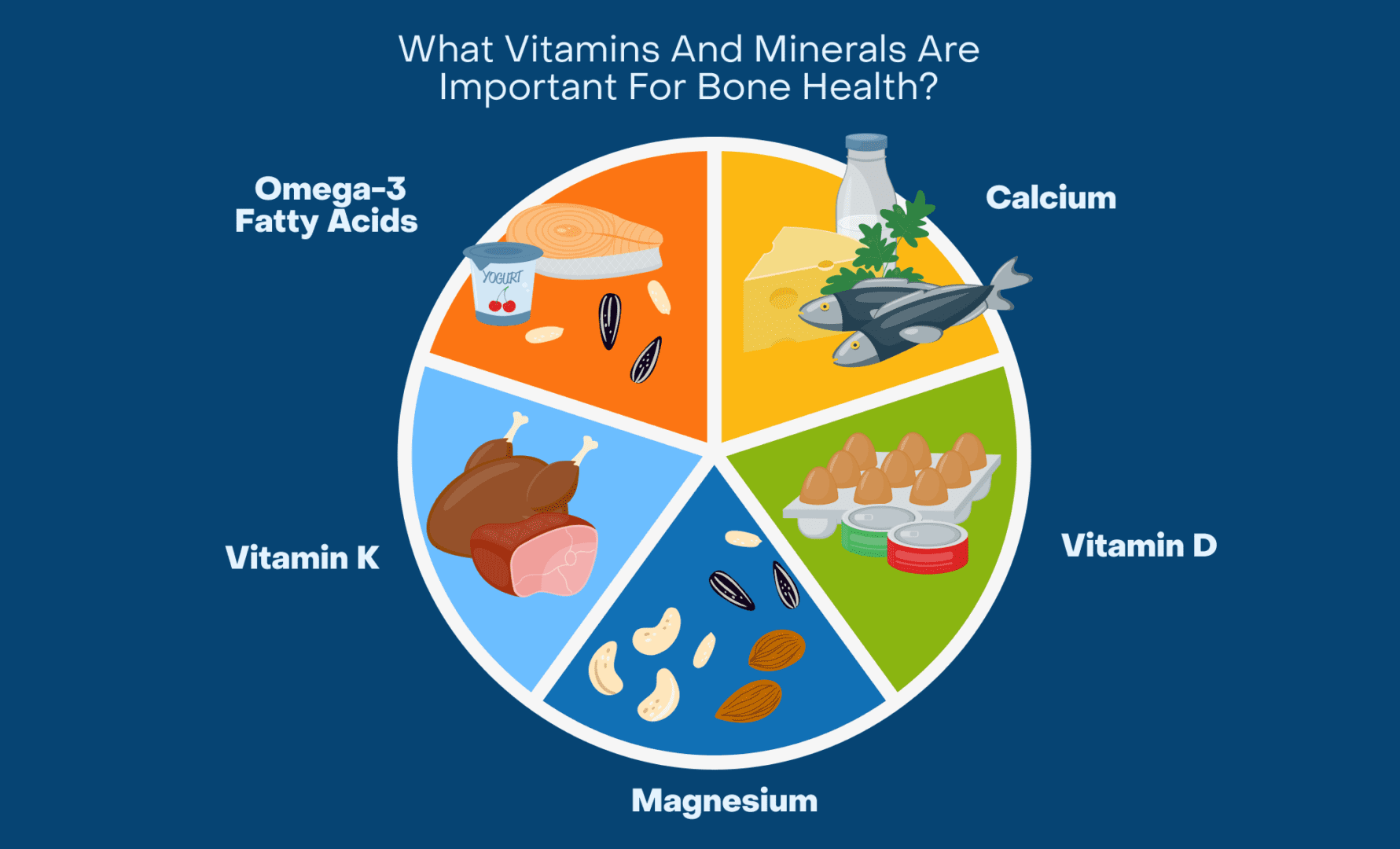
1. Calcium
There are many nutrients that are essential to optimal spine and bone health. One of the most important is calcium. Calcium is stored in our bones. When you don’t get enough calcium in your diet, the body will pull calcium from the bones to support the many other physiologic processes in our bodies that require calcium. If too much calcium is removed for other functions, the bones become weak and fragile.
Dairy products are the most well-known sources of calcium, but you do not need to rely solely on milk, yogurt, and cheese to supply your calcium needs. You should also get your calcium from other foods like:
- Leafy green vegetables
- Fish
- Beans
- Nuts and seeds
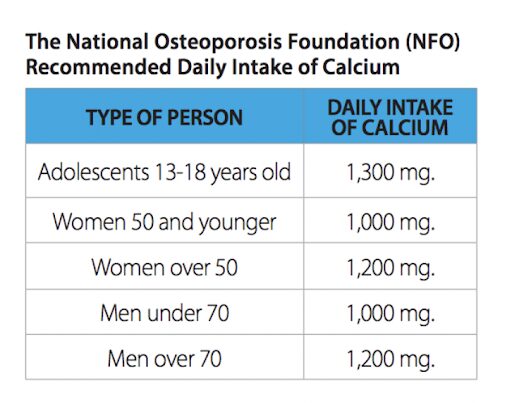
There are debates surrounding the use of calcium supplements. As with any medication or supplement, the risks and benefits must be considered on an individual basis, which is best done with your medical provider. Healthy adults and children should aim to get the recommended daily amount of calcium from food first and supplement only if needed and recommended by a medical provider. In fact, there is no added benefit to taking more calcium than you need and doing so may increase your risk of other health issues.
2. Vitamin D
One of the other most important nutrients for spine health is Vitamin D. Vitamin D is essential for the body to absorb calcium. Pairing calcium-rich foods with foods high in Vitamin D, such as egg yolks, shiitake mushrooms, and fish (specifically salmon, mackerel, sardines, and canned tuna), will help the absorption of calcium from your food. Remember, even if you are getting enough calcium in your diet, if you don’t absorb it into your body, then it cannot do its job.
Direct sunlight is a natural source of Vitamin D, but we are commonly not spending enough time outdoors to maintain our Vitamin D levels. If your doctor has diagnosed a Vitamin D deficiency, they will recommend Vitamin D supplements to boost the levels back to normal. The National Osteoporosis Foundation recommends women and men over the age of 50 years to consume 800 – 1,000 IU of Vitamin D daily.
Vitamin D has also been suggested to improve spinal surgery outcomes. One small study found that patients taking Vitamin D plus calcium supplements for three months after spinal fusion surgery had a shorter time to fusion, better spinal function, and less pain after surgery compared to those only taking calcium supplements.
3. Magnesium
Magnesium is another nutrient that plays an important role in bone health. Magnesium, similar to Vitamin D, enhances the absorption of calcium from the blood into the bone. Magnesium also helps to convert Vitamin D into its active form, which then aids in calcium absorption.
You can help to maintain healthy magnesium levels by including foods like: spinach, pumpkin, sesame and sunflower seeds, mackerel, beans, quinoa, brown rice, cashews, and almonds. Many people don’t get enough magnesium through diet alone, so discuss supplementing with your medical provider. Aim for 400 – 800 mg of magnesium a day.
4. Vitamin K
Low levels of Vitamin K are also emerging as a dietary risk factor for osteoporosis. Vitamin K deficiency has been linked to an increased risk of osteoporotic fractures. Vitamin K can be found in three forms, K1, K2, and K3. One study suggests that Vitamin K2 does a better job at increasing bone density and promoting bone quality.
Dietary sources of Vitamin K2 are primarily found in fermented foods such as Natto, cheeses such as Brie and Gouda, meat, poultry, and eggs. Two common supplemental forms of Vitamin K2 are menaquinone-4 (mk-4) and menaquinone-7 (mk-7). Mk-7 is derived from a natural fermentation process and has a longer duration of action, making it a better choice for supplementation.
Discuss supplementation with your medical provider, who may suggest 45 – 150 micrograms of K2 in the form of mk-7 per day to increase bone strength. Use caution when supplementing with Vitamin K if you are taking anticoagulant medications. The risks and benefits will be discussed by your medical provider.
Studies have shown that postmenopausal women with osteoporosis who supplemented with Vitamin K2 achieved significant improvement in bone mineral density and reduction in the overall risk of fractures.
5. Omega-3 Fatty Acids
Omega-3 fatty acids have anti-inflammatory properties that can help reduce inflammation in the body. Inflammation is commonly involved with many spinal conditions, such as spinal arthritis, disc degeneration, and acute injuries.
Get your omega-3 fatty acids in foods like salmon, nuts, oils and yogurt. Omega-3s have been associated with protecting the body from stroke, controlling rheumatoid arthritis, and helping with a wide variety of brain and body functions.
What other foods are important for bone health?
In addition to seeking out the foods mentioned above, targeting certain food groups can be helpful in maintaining a healthy spine. Try creating a weekly meal plan to ensure you are incorporating all of these each day:
1. Fruits and vegetables
Fruits and vegetables are rich in antioxidants, which help combat oxidative stress in the body, which can contribute to tissue damage and inflammation. A diet high in antioxidants may help reduce inflammation in the spine and promote overall spinal health.
2. Whole Grains
Grains are key sources of vitamins and minerals, high in fiber, and studies show they are linked to lower risk of heart disease, diabetes, cancer and many other issues in addition to benefiting spine health! Try whole oats, whole grain bread, quinoa and more next time you go shopping.
3. Leafy Greens
Leafy greens have countless benefits, offering tons of Vitamin K and positively affecting inflammation, osteoporosis, and degenerative disc disease. Think spinach, kale, cabbage and other similar produce items.
4. Protein
Proteins are the building blocks of muscles, ligaments, and other soft tissues surrounding the spine. Adequate protein intake supports muscle strength and repair, which is important for maintaining proper posture and supporting the spine’s structure.
There are ongoing debates about the effects of animal protein on bone health, which can have both positive and negative effects. It appears that it is the calcium balance that is important, and will be based on each individual’s dietary habits. Incorporating a variety of protein sources into your diet is a good option.
Many plants provide proteins and are also an excellent source of vitamins, minerals, fibers, and antioxidants that are essential to bones. For optimal bone health, add variety to your diet by intermixing nutritious plant-based proteins (beans, legumes, nuts, seeds, natural soy) with high-quality animal proteins (eggs, salmon, lean meats). This will ensure you get all the valuable nutrients needed to build a strong body.
Supplementing with vitamins for bone health
Food is the best source of these nutrients, but supplemental vitamins and minerals can ensure the needs of the body are met when the diet does not provide them.
Supplementation may be especially necessary for:
- individuals with specific dietary restrictions, food allergies, or decreased absorption of nutrients
- the elderly
- individuals who spend less than 20 minutes per day in direct sunlight
- those with a spine or bone disease that is linked to nutritional status (e.g., osteoporosis).
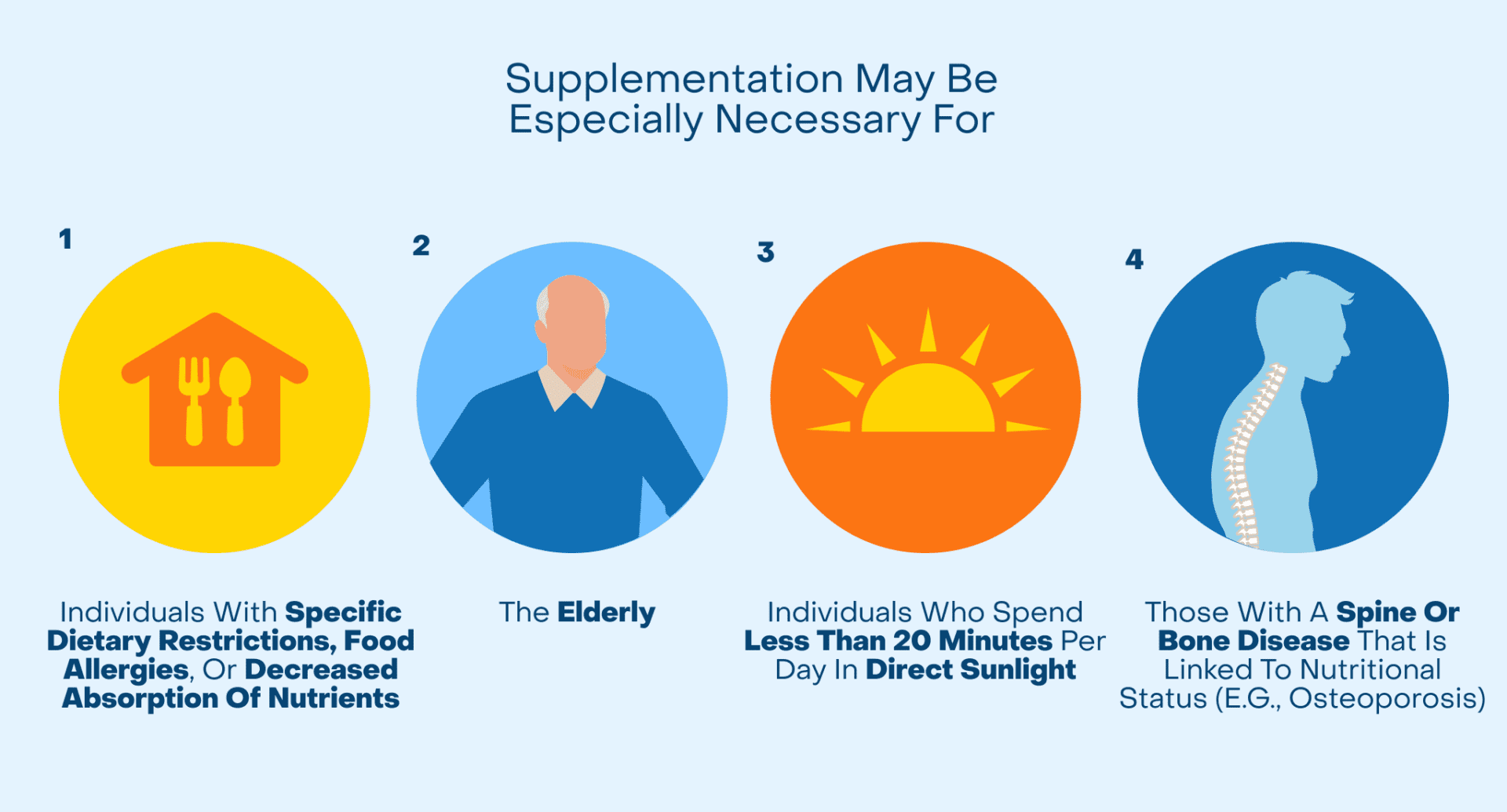
Osteoporosis and diet
Osteoporosis is a medical condition characterized by the weakening of bones, which leads to a higher risk of bone fractures. It is sometimes called a “silent disease” because many people do not realize they have it until a fracture occurs, since there are no symptoms that prompt early evaluation.
Our diet plays a critical role in supporting our bones – especially when we’re young. It’s a common misconception that osteoporosis is only something to think about when you’re older. The human body adds calcium to our skeletons to achieve peak bone mass up until about 30 years of age; then, we start to lose calcium and break down bone at an increasing rate over time. Our bones eventually become weaker with age.
Inadequate intake of calcium and Vitamin D leads to deficiencies in the vitamins and minerals necessary to strengthen bone. Getting enough of these nutrients when we are young helps to build up a “bank” for our bones to use in the future. Malnutrition is a risk factor for osteoporosis.
But if you’ve already reached your peak bone mass, or if you have been diagnosed with osteoporosis, this doesn’t mean there’s nothing you can do for your spine health! It will always be beneficial to make the same kind of lifestyle changes that prevent osteoporosis in the first place. A nutrient-dense diet, and weight-bearing exercise can help prevent further bone loss and support the rebuilding of bones.
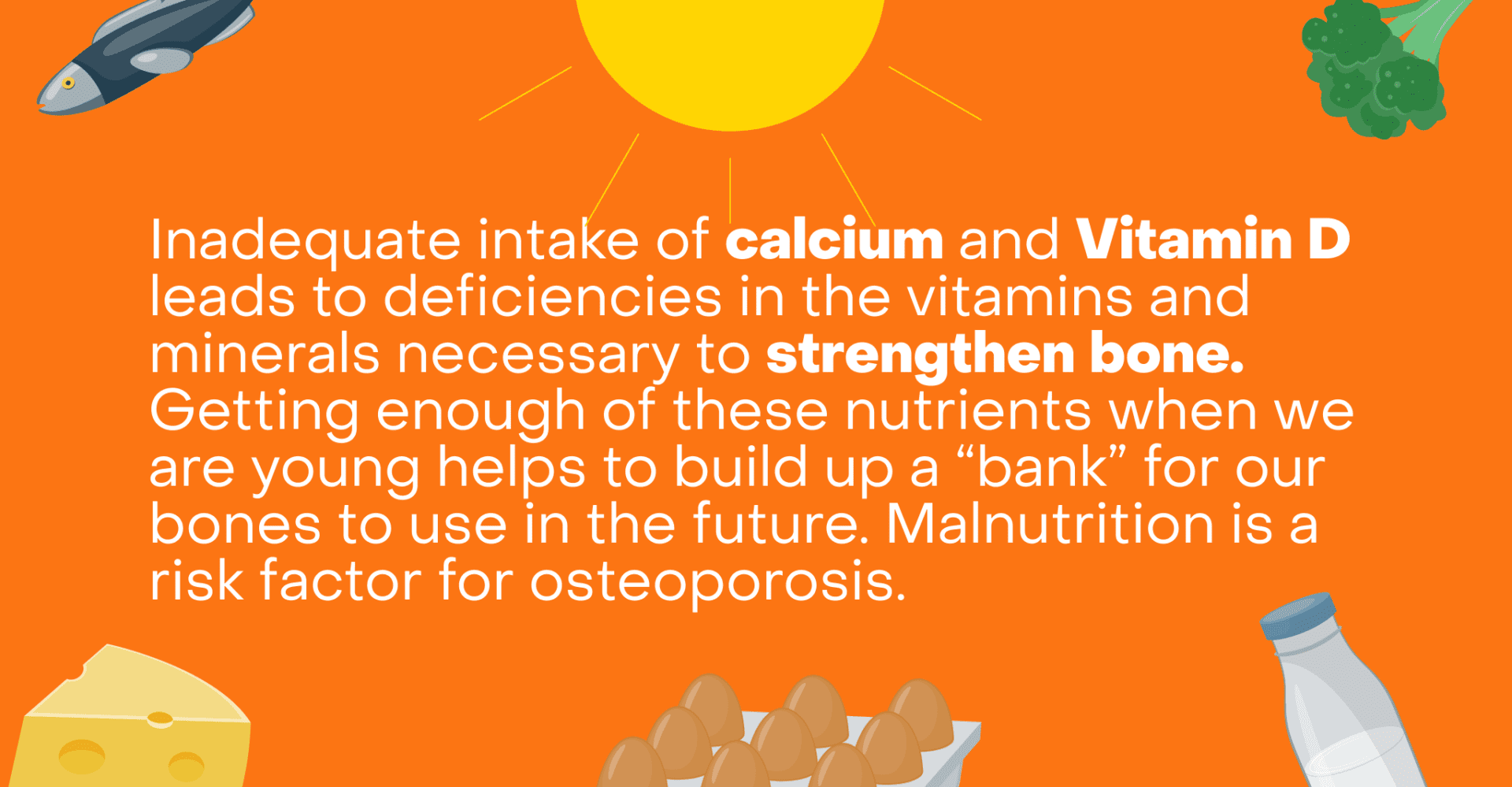
Water and spine health
Water is essential for transporting nutrients to your spinal tissues, including the discs, muscles, and nerves. Proper hydration ensures that essential nutrients reach these tissues.
Drinking enough water also ensures that your intervertebral discs maintain their elasticity and ability to absorb shock. Dehydration can lead to decreased disc height, which may result in conditions like disc degeneration or herniation.
Water helps produce synovial fluid, which lubricates the joints, including the facet joints in the spine. Drinking water may help to reduce back pain and stiffness as these joints become more lubricated.
What NOT to eat and drink for bone health
What you don’t consume is often just as important as what you do consume. Some foods can promote inflammation in the body. Examples are those high in refined sugars, saturated fats, and processed ingredients.
1. Refined Sugar
Diets high in refined sugar have been shown to impair bone growth.
2. Carbonated soft drinks
Drinking carbonated soft drinks containing phosphates and coloring has been shown to interfere with calcium metabolism.
3. Processed foods
Salt, especially abundant in processed foods, increases the excretion of calcium through the urine.
4. Excessive caffeine
Four or more cups of coffee a day can result in loss of calcium and magnesium, predisposing you to higher risk of fractures.
5. Alcohol
Alcohol alters bone formation and remodeling, interferes with calcium balance, causes disruption in hormones, which can lead to irregular menstrual cycles in women and decreased testosterone in men, and can elevate cortisol levels, leading to bone breakdown. To maintain healthy bones, limit your alcohol to one or two drinks a day.
6. Cigarettes
By far, one of the biggest risk factors for osteoporosis is smoking. Smoking a pack of cigarettes a day increases your risk of osteoporosis by 60%. It has been shown that adolescents who smoke fail to achieve peak bone mass. Vaping is another source of nicotine with detrimental effects that must be avoided.
Four tips for increasing nutrient density in your diet:
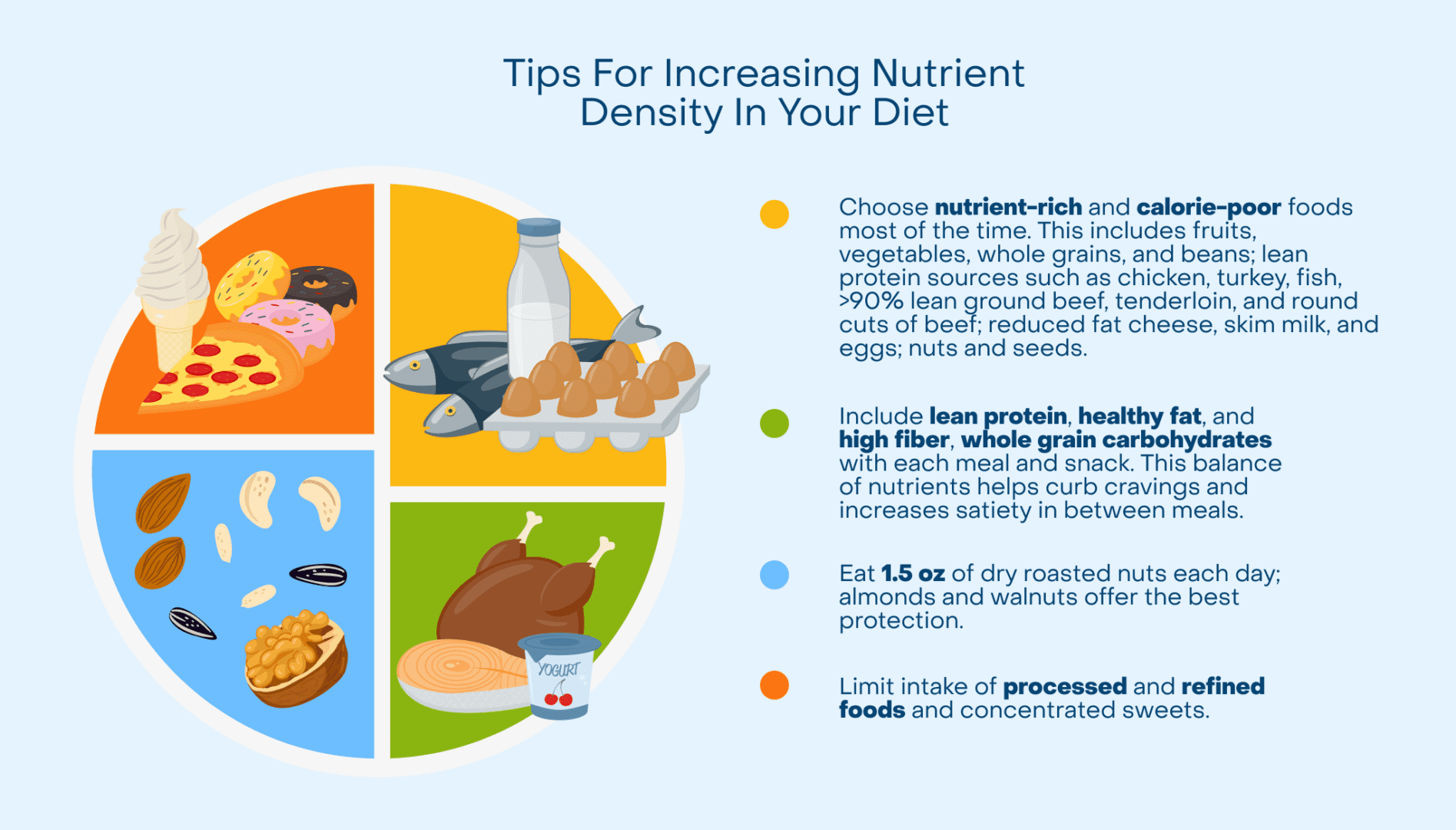
- Choose nutrient-rich and calorie-poor foods most of the time. This includes fruits, vegetables, whole grains, and beans; lean protein sources such as chicken, turkey, fish, >90% lean ground beef, tenderloin, and round cuts of beef; reduced fat cheese, skim milk, and eggs; nuts and seeds.
- Include lean protein, healthy fat, and high fiber, whole grain carbohydrates with each meal and snack. This balance of nutrients helps curb cravings and increases satiety in between meals.
- Eat 1.5 oz of dry roasted nuts each day; almonds and walnuts offer the best protection.
- Limit intake of processed and refined foods and concentrated sweets.
Maintaining a healthy weight
Spine health and nutrition isn’t just about what you consume and don’t consume. It’s also about making sure that you watch the quantities of food you eat. Excess weight puts added stress on the spine, increasing the risk of conditions like degenerative disc disease, herniated discs, and spinal stenosis. Obesity has frequently been linked to spinal disorders.
A balanced diet and regular exercise can help maintain a healthy weight, reducing strain on the spine. Practice plate portioning as a means to control caloric intake. Aim to fill half of your dinner plate with salad greens or fresh vegetables, a quarter with lean protein and a quarter with whole grains.
Also, try eating smaller meals more frequently throughout the day. This prevents dips in blood sugar that cause cravings and/or lead to overeating.
Recovering from spine surgery
Nutrition is important before and after spine surgery. Studies show that optimizing patients’ nutrition prior to surgery can have a significant effect on their surgical outcomes. And the ability to heal efficiently after surgery is essential to ensuring a good outcome. Poor nutrition has been found to increase the incidence of postoperative complications.
By its very nature, surgery causes stress and trauma to the body. Surgery can result in local tissue damage and inflammation as well as metabolic stress and weakening of the immune system. Maintaining a proper diet can help you heal faster.
Even though after surgery you are often inactive for a while and require more rest than usual, this is not the time to cut calories. Your body goes into a hyper-metabolic state after surgery, where the body’s metabolism increases, resulting in the breakdown of muscle protein. You should strive to eat 10-12 calories for every pound of your ideal body weight, each day in the early phases of surgical recovery.
Protein is also important at this time as well. Protein is a key building block of our body and is necessary for tissue growth and repair. Adequate protein recovery is extremely important for rebuilding tissue, fighting infection, slowing down muscle loss, and helping to decrease the inflammatory phase.
Conclusion
As we age, proper nutrition continues to be necessary to maintain a strong skeleton and spine.
A well-balanced diet rich in essential nutrients like calcium and Vitamin D plays a crucial role in maintaining spine health. These nutrients support bone density, muscle function, and overall tissue health, and can reduce the risk of osteoporosis, degenerative disc disease, and chronic back pain.
It is never too late to start thinking about your nutrition, even if you already have a spinal condition or osteoporosis! By improving your diet and adjusting your lifestyle habits, you can slow down bone loss and give your body the building blocks it needs to live an active life.
